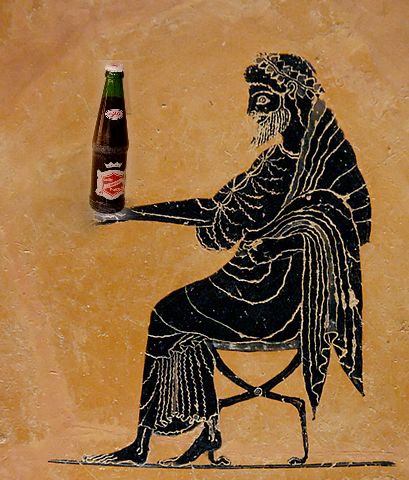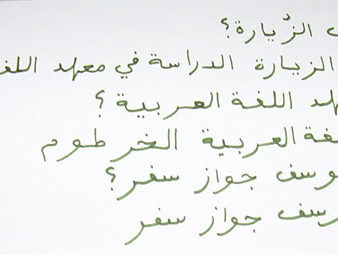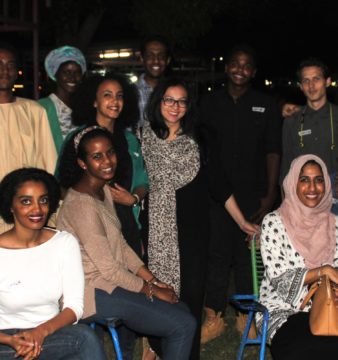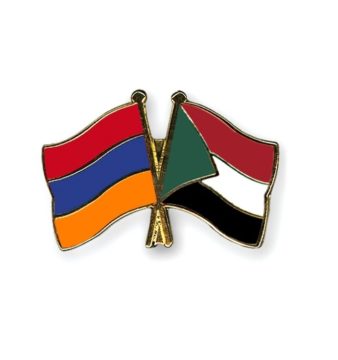Ancient Nubia, Pasgianos, and the Legacy of Greek-Sudanese
Every other week Rushaa Hamid looks at groups and people grappling with a Sudanese identity outside of the mainstream, publicised one. This week she looks at the impact of the Greek-Sudanese community in both North and South Sudan.

Greek god Dionysos (Original art source: greekmyths.net)
When looking at Sudanese minorities to focus on it can sometimes be difficult to find up-to-date information. Many communities have been lost, pushed out by conflict or particular policies or just a gradual erosion of their unique culture, and so disappear from our collective national memory. The Greek-Sudanese are slightly different – interaction between Greeks and Sudanese goes back centuries, all the way to the pharaonic rule; some monuments of ancient Nubian have Greek inscriptions suggesting a deep understanding of the language, and Greek design and architecture is occasionally used in the building work and iconography. Greeks not only came across for trade but also to participate in the hubs of learning and teaching that existed in Old Dongola and other cities. These historical ties also worked the other way; the village of Avato in Greece has larger numbers of black residents who likely originate from Sudanese that came over and settled during the Ottoman period. The mixing of these cultures is firmly cemented in the history books.
Modern times brought new inflows of traders and even now you can see the trace they left, strolling past churches or the Greek Club. Videos like this one show the fierce attachment and active participation that the Greek-Sudanese had in day-to-day life. Like most groups who arrive as merchants their impact was not limited to just Khartoum, but across all major hubs.
Juba itself has a strongly patriotic Greek-Sudanese community which at its height numbered almost 10,000 people. They, on settling, built the neighbourhood now known as Hay Jellaba, once referred to by the British as ‘the Greek Quarters’. In an article on Al Arabyia Greek-Sudanese Ghines discusses his sadness at often being mistaken for a foreigner because of his appearance; “When I walk down the streets of Juba, I don’t imagine myself as anything other than south Sudanese.” With conflict in South Sudan pushing many of the community to Greece, Ghines was proud to be able to return to his country and set up a restaurant blending Greek and South Sudanese food to reflect his heritage. These people helped to shape building space and learning in the two countries, often intermarrying, creating an enduring legacy.
Perhaps though the best and most fitting example of the impact of Greek-Sudanese is the classic childhood drink of Pasgianos. The Sudan-only soda was an invention of George Dmitri Pasgianos, one of the Greek merchants to come to the country around 1930 during the period of British and Egyptian rule. When he arrived he decided to create a fizzy drink to sell in the Khartoum market. For him it was important in forming the recipe to merge his Greek roots with local influences in the drink, creating its unique flavour. Journalist Hana Baba‘s in-depth story on Pasgianos is a great look at this Sudanese-made innovation, and the long-lasting success and sentiment conjured by the drink more than anything shows the importance of embracing minority groups within both Sudans’, and the profound impact they can bring.
 Rushaa is a (sort of) Sudanese freelance writer whose work has appeared on sites such as The Independent, BuzzFeed and Dazed. She can be found on Twitter or at her website.
Rushaa is a (sort of) Sudanese freelance writer whose work has appeared on sites such as The Independent, BuzzFeed and Dazed. She can be found on Twitter or at her website.





The first Greeks started appearing in Sudan in 1821. During that time Greece was going through war of independence from the Ottoman Empire. Later during the Anglo-Egyptian condominium where basically Egypt and Sudan were ruled by the British Empire, the Greeks from Egypt were supplying the Anglo-Egyptian army in Sudan. Kitchener decorated a few Greeks for their excellent ‘service’. Mahdi slaughtered a few along with the Honorary Consul Leondaridis for the same ‘service’.
Later on as Greece’s economic and political situation was very unstable and weak many traders, doctors, mechanics, technicians migrated to Sudan and established the Greek community in early 1900’s in Khartoum.
We all like to call our selves Sudanese. Very few Greeks were ‘officially’ married to Sudanese. And they as well as their children were always discriminated by the greater Greek community in Sudan.
What am trying to get to is that historically there was (is) always the element of ‘benefit for profit’ from the Greeks towards Sudan. Therefore I understand the difficulty of a Sudanese or South Sudanese considering us as one of them.
(Greek/Sudanese with dual nationality)
I found out recently that Sudanese eid white sugared gak is actually widely eaten in Greece & appears to have being a greek tradition that was adopteed by the Sudanese & became an entrenched part of our culture.